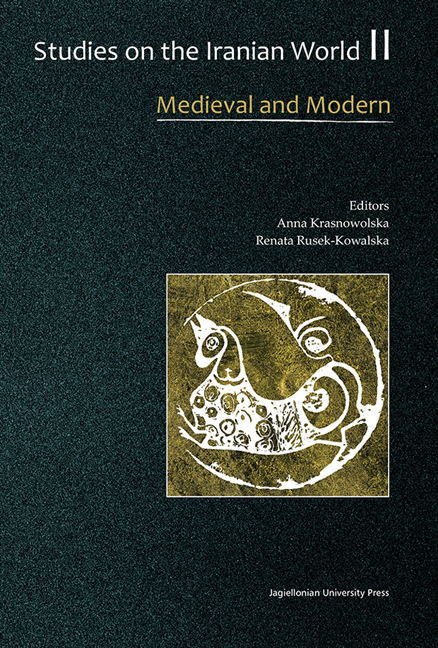Book contents
- Frontmatter
- Contents
- Foreword
- Linguistics
- Literature
- Religion
- History
- Arts
- Social and Cultural Studies
- Amulets and Medical Cures in the Yaghnob Valley: an Overview of Yaghnobi Traditional Medicine between Magic and Healing Folklore
- Persian Cookbooks, the ‘Myth’ of National Cuisine and the Process of Modernisation
- Modernity and Fertility Decline in Iran
- Medicine and Anthropology: the ‘Ambassador-Physician’ Jacob Eduard Polak (1818–1891) as a Mediator of Modernity in Iran
- Anatomy and Therapy of Eye-Diseases in Esmā῾īl Gorgānī Compared to Syriac Sources
- The Trans-Iranian Railway – History and Socio-Political Implications
- Traditional Diet and Allopathic Medicine in Diagnosis and Treatment in Iran
Between Tradition and Modernity: Došmanziyāri Khans’ Adaptations to Social Change
from Social and Cultural Studies
Published online by Cambridge University Press: 12 January 2018
- Frontmatter
- Contents
- Foreword
- Linguistics
- Literature
- Religion
- History
- Arts
- Social and Cultural Studies
- Amulets and Medical Cures in the Yaghnob Valley: an Overview of Yaghnobi Traditional Medicine between Magic and Healing Folklore
- Persian Cookbooks, the ‘Myth’ of National Cuisine and the Process of Modernisation
- Modernity and Fertility Decline in Iran
- Medicine and Anthropology: the ‘Ambassador-Physician’ Jacob Eduard Polak (1818–1891) as a Mediator of Modernity in Iran
- Anatomy and Therapy of Eye-Diseases in Esmā῾īl Gorgānī Compared to Syriac Sources
- The Trans-Iranian Railway – History and Socio-Political Implications
- Traditional Diet and Allopathic Medicine in Diagnosis and Treatment in Iran
Summary
SUMMARY
The khans of the Došmanziyāri, a tribe in southwest Iran, ruled as oligarchs over the tribe's territory and its over 10,000 inhabitants, strengthened by their function as the shah's local military recruiters and tax collectors. In five hill fortresses they displayed their status and devised military strategies against other khans until the land reform (1966), which changed the traditional patterns of land ownership and politics. Further deprived of influence and properties after the Islamic Revolution (1979), and politically trailing behind the new rural elites established by government programs after the war against Iraq (1980–1988), the khans’ families were reduced to the status of common people. The paper analyzes the traces left by the impact of these developments on the khans’ families’ lifestyle and on their marital, professional and economic choices in the current social trends as well as presents the features of the new elite class, adapting better to these trends.
I attempt in this article to analyze the social dynamism in the Došmanziyāri tribe living in southwest of Iran using ethnographic data on local power relationships, gathered during my fieldwork sessions (1994–2002) and in research on web sites.
Focusing on changes in the socio-political structure, the article is composed of four parts: the changes of the khans’ families’ situation in the political modernization process; the transformations of its matrimonial pattern; the presentation of the current elite classes; and an analysis of the main factors in upward social mobility.
THE CHANGES OF THE KHANS’ FAMILY's SITUATION IN THE POLITICAL MODERNIZATION PROCESS
Introduction: The Došmanziyāri Tribe
The Došmanziyāri that we will investigate here are a Lori-speaking group living in the Zagros Mountains of southwest Iran (map 1). They are all Shi'ites. 91% of them (1840 families, environ 10 000 inhabitants) were practicing transhumant agriculture until 1967, utilizing the various environments in different altitudes (between 800 m and 2400 m) of the Zagros. Two khans and their three cousins of patrilineal descent ruled as oligarchs over the tribe's territory (about 530 square kilometers) until the land reform, which started there from 1966 onwards under Mohammad Rezā Shah's rule.
- Type
- Chapter
- Information
- Studies on the Iranian WorldMedieval and Modern, pp. 367 - 388Publisher: Jagiellonian University PressPrint publication year: 2015



